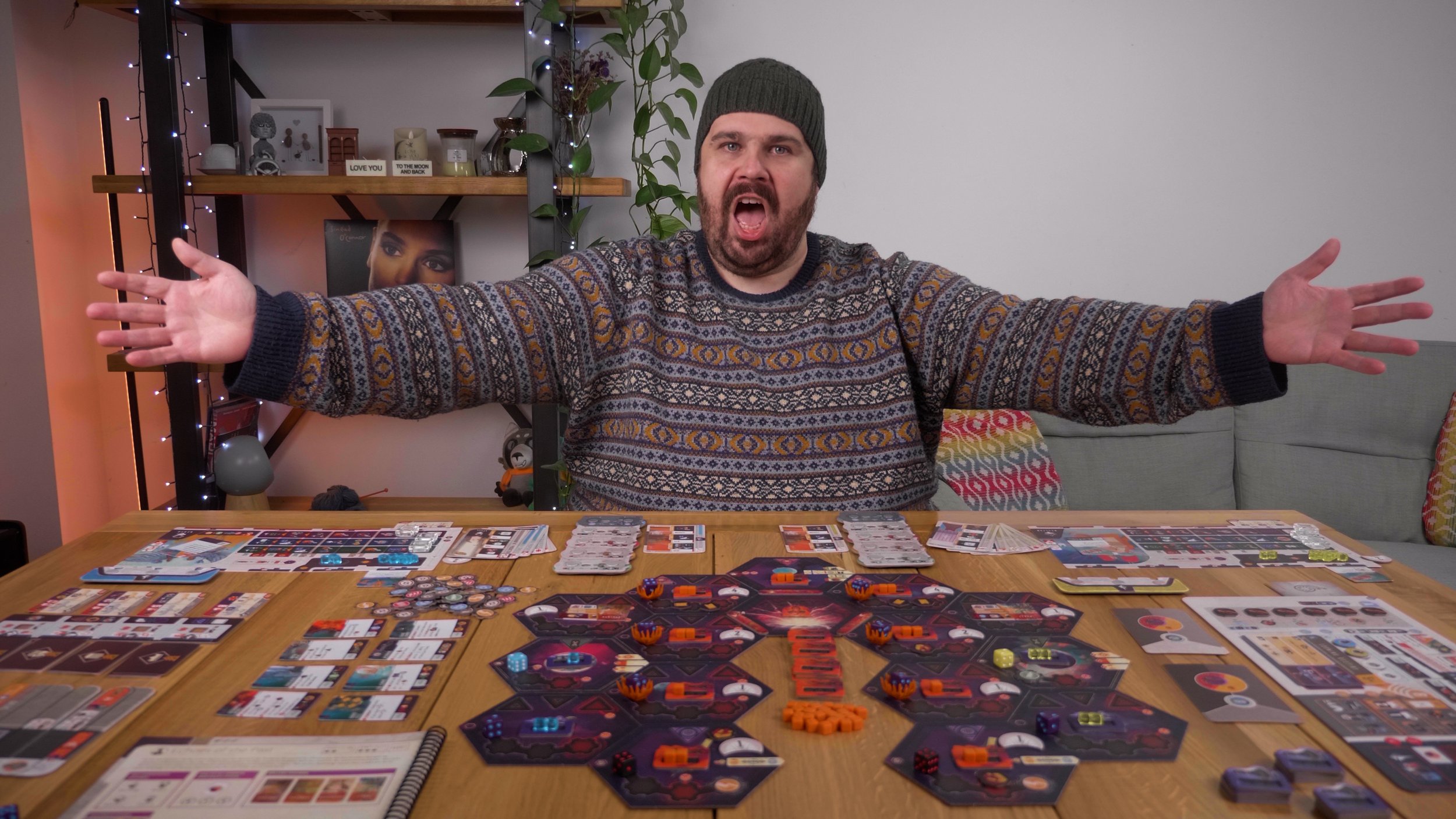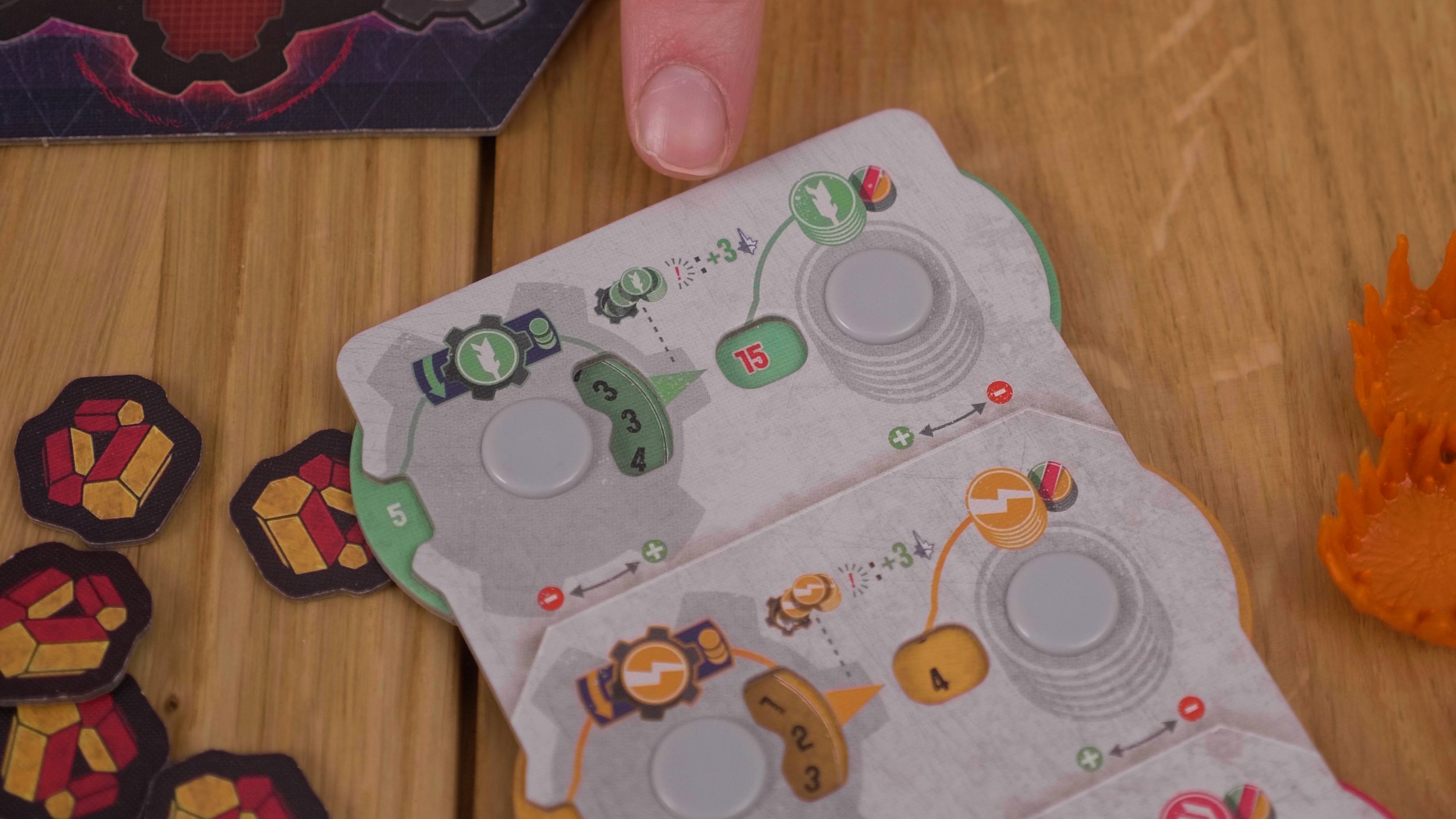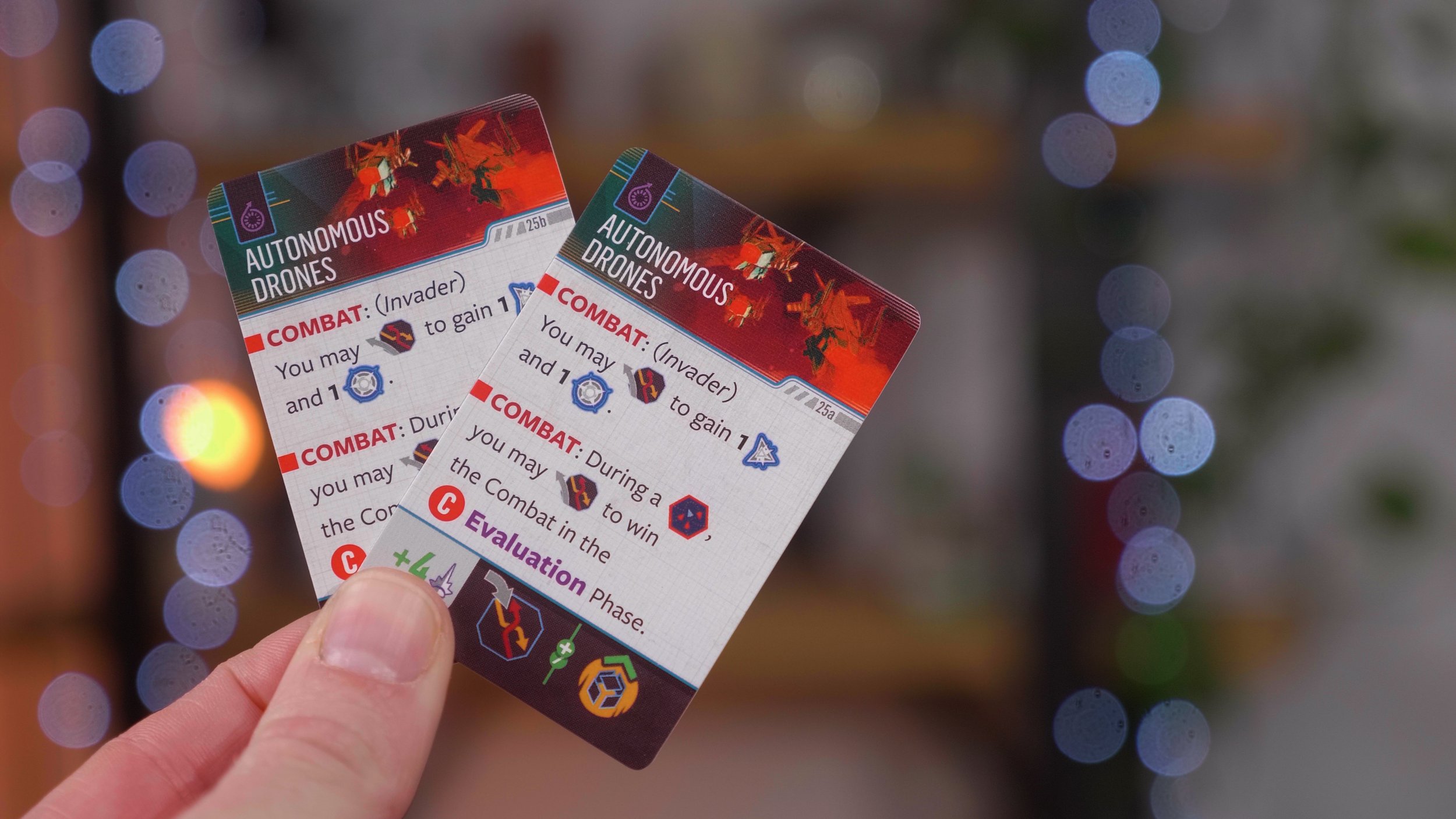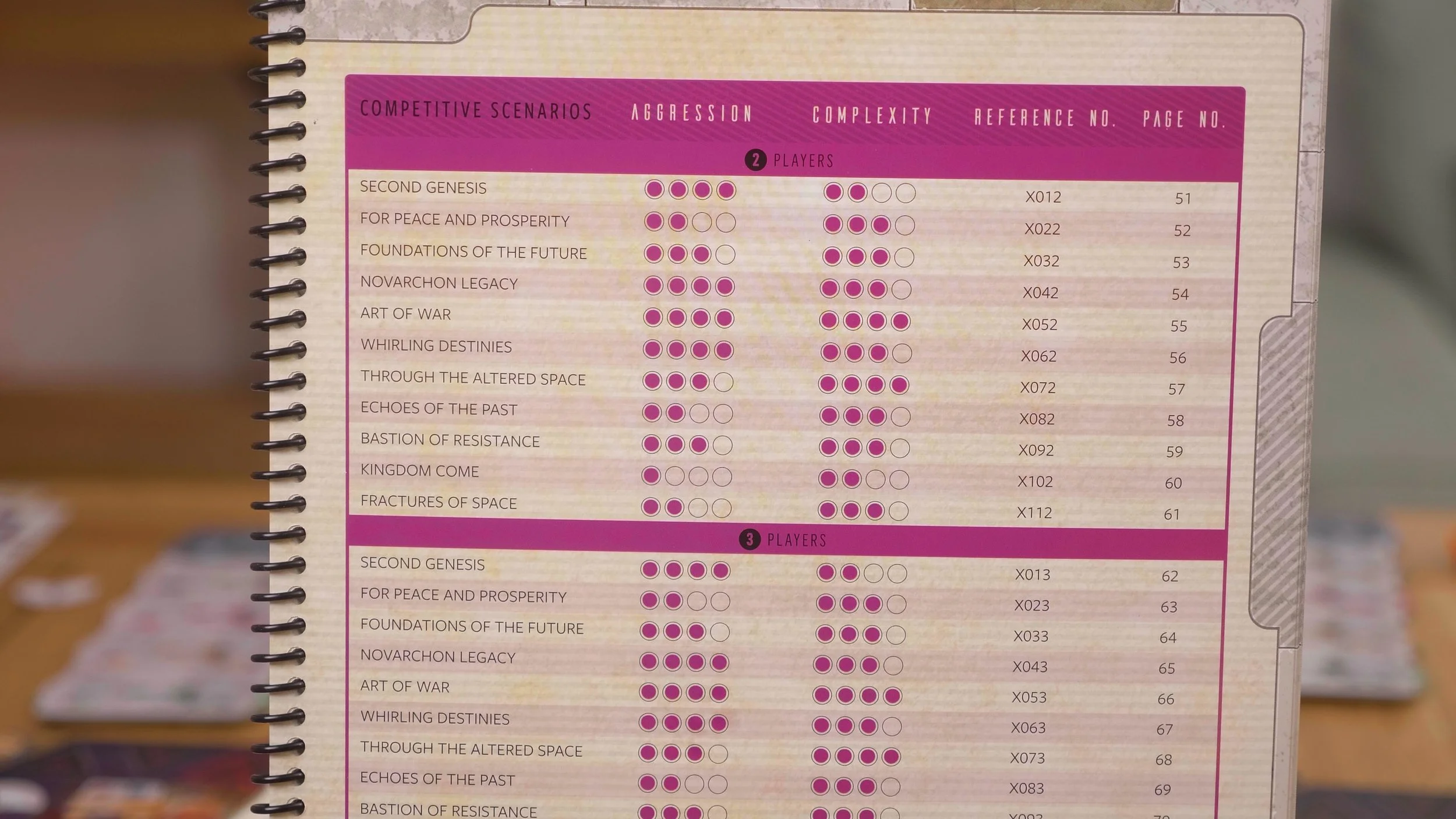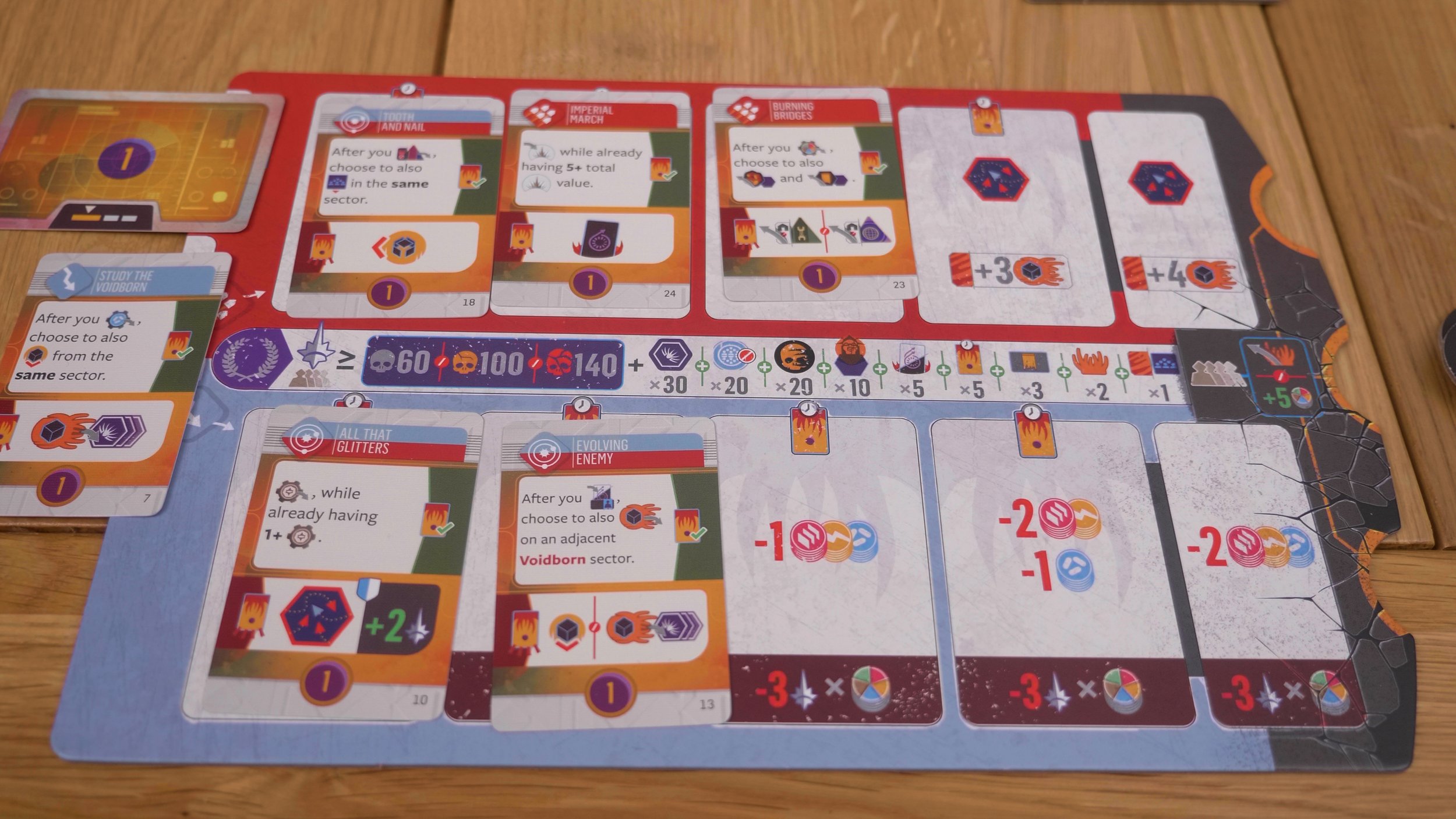Voidfall and the Contentification of Board Games
Hey everybody, big space game just dropped. That’s right, once more cardboard is inviting us to put spaceships on hexagons and claim more teritorry than your neighbor. The twist this time is that instead of uneasy alliances, territorial tensions and tumbling dice, every body plays the space lions - methodically calculating the most efficient ratio of action to victory point.
Below is a transcript of our video review of Voidfall.
They say space is impossibly big, but is it big enough to contain Voidfall? Don't answer that.
Take the game's resource system for example. In other games when you produce a resource you just get it. In Voidfall you have five resources: food, energy, materials, credits - which can be spent as the other free but only in certain situations – and science.
To get these resources first you must build an appropriate guild. Food guild for food resources, science guild for science resources, and so on. The number of guilds you have in a given sector is then multiplied by the population value of that sector. Add those values together for all of your sectors - the result is the production value of your guilds of that type. But that's not how much you produce, that's just a value, but that value directly modifies the output value which is how much of that resource you produce when you do the produce action.
This is Voidfall - a big space game of grand strategy, grand spaceships, grand asymmetrical factions, and grand brains. That intro should have given you a pretty good idea of the level of complexity that Voidfall is aiming for. In fact I think the two talking points that will gravitate around this game's orbit are:
· It's just too complicated
· It's just a euro game masquerading as space strategy.
Keep these two in mind through the course of the video.
You'll notice there's one or two game pieces on the table and whilst it definitely adds to the grandness of it all, strangely what's really important is this small area over here.
This is the agenda offering. Each agenda card is another potential way of scoring points and having the most points wins you the game. Your House - that being your space faction - will come with a starting agenda, but you will want to pick up more ideally overlapping in goals so you can score the things that you achieve multiple times.
For example, this is House Nervo, an industrious faction of humans who abandoned flesh for efficiency. Effleshiency? That sounds right. And naturally they'll score points for every sector that has all of their guild and space station slots fully filled up, and advancing as far as they can on the three civilization tracks.
Which means agendas like Industrial Conglomerate which reward you for having Guilds in different sectors and filling them up to capacity will score you points for things that you're already doing anyway, whereas agendas like Bleeding Edge that score you points for combat rewards and improved Technologies force you to divest your energy into things that aren't necessarily profitable.
And almost always the more sectors you have the more times you can multiply these scoring conditions, and that's on top of the resource farms you can build on them, which is where we arrive at the why.
To win, you need points to get points you need agendas and agendas want more sectors so what do you do in this game?
EXPAAAAND! And just in case it wasn't clear what you do in this game - EXPAAAAND!
That was fun for about 3 seconds but now let's get back to our homework.
So at this point you might be wondering 'Okay we have space empires, we have space-agons, how do they translate into space agendas and space points? Well I'm not going to show you this entire game, but I do want to showcase a few mechanisms and how they shake out.
The majority of what you do is determined by focus cards. You play one of these a turn, and choose two out of the three possible actions on them.
For example, this is House Bellitan. Their whole stick is that they've said 'Emotions? That stuff's for crying babies! It's all about RAW CALCULUS POWER!' and also 'RAW MILITARY POWER!' So they grew extra brain tissue outside of the skull and then jacked cables into it. Is that brain tissue protected by anything? No! Do they care? Remember, no emotions - they just don't give a [ships].
Anyway, so you picked a faction that's all about... guns and money. Oh, they looked so nice in the picture.
Naturally you'll be wanting to expand with the guns to get more money to get more guns and so on. The reinforcements card will let you take the muster action by paying two material. Then for each shipyard you have in your sectors, simply make one spaceship.
Other actions are also equally simple. For example, if something lets you build a Guild simply pick any Guild that you would like and just place it in your sector, adjusting the output of the resources it makes based on the sector's population.
Even the resource production system we lampooned in the intro is actually reliably free of hassle once you understand the literal cogs that make it turn - anytime you make a resource simply look up how much of that resource you produce and then add it to your total.
Aside from combat, which we will talk about, later no system in this game is complex or something that a person used to euro games couldn't wrap their head around. It's the consequences of what you do that will make your brain hurt.
Each time you produce more resources than can be stored by your capacity they go to waste, but you immediately get three additional victory points. Is that worth it? Hard to say. But there's also a faction that will give you bonuses each time you overproduce which would incentivise them to build a lot of guilds, but every time you fill up a sector with guilds, that increases the demand for food - which you have to account for at the end of every cycle or lose victory points.
Agenda cards also increase your demand for food, however you can cover up that demand with trade tokens. But you can also spend the trade token from your agenda to take all three actions on your focus card instead of just the requisite two, which is very strong but then everyone is starving again.
Remember building ships? The action is as simple as described, but you can only build spaceships if they're available in your supply. If you don't have any you have to make them available via an action that is on an altogether different card, meaning it will suck up one of the actions for the cycle. Or take the exert action on the temptation card which lets you do both but then corrupts either; one of your sectors, or your agendas, or one of your civilization tracks - which will make them ineligible for scoring.
None of this is hyperbole in fact this is the simplified version of the brain loop roller coaster you're standing in line for if you're considering Voidfall as part of your collection. You could not unreasonably spend 10 minutes just deciding which one card am I going to play, and the tenor of this game is such that your opponents won't even mind because they've very likely been doing the same.
This isn't a criticism, it's in fact the intended experience - further reinforced by galactic event cards. The whole game is split into three cycles, each offering an opportunity to score agenda cards at the end, and then punctuated by the galactic event.
It sets up the stage for what's important this cycle. For example, an event might say 'At the end of the cycle you'll score extra points for controlling sectors with finance guilds', and they're quite a bit more complicated than that.
Often there's two different conditions for getting bonuses and quite frequently they change the game state but all it is a very clever way of funnelling you into new objectives. A galactic event creates play arcs and puzzles, it gives this mishmash of pieces and space-agons a direction.
Which honestly you could ignore if you wanted to, but they're precisely tuned to each scenario. Scenario that has specific factions, technologies, a map layout, and a set of these cards.
Everything speaks to a curated experience and intentionality and you can just feel it during play as you brute force every ounce of efficiency, clawing towards the next space-agon you understand why this map is laid out like that, why you're allowed these technologies and not the others, why these specific Houses are in play. It's very smart and it wants you to glimpse that smartness so you can overcome the challenge its deliberately posing.
By this point of the video you're probably... a bit bored, because I'm talking about a space game and so far I haven't told you about how you forge alliances in betrayals with other players, how you smash your spaceships to take over a hexagon - you know all that juicy space game stuff. Well, here's the thing. None of that happens here.
Technically you can fight other players but mostly you're separated by so much space that getting into territorial skirmishes takes about as much time as realistically depicted interstellar travel.
I'm not saying this as a criticism I'm just managing expectations. Voidfall is 95% a euro game with a few other bits added to pass the visual litmus test of 4X or whatever you want to call this genre. If you're familiar with board games this is more Gaia Project than Eclipse and if you're not familiar with board games this is 'Space! The complicated math game'.
Uh talking of complicated I've got a bit of a bone to pick with how board gamers perceive complexity.
Complexity is a strange thing and we attribute weird qualities to it. Being a board game reviewer makes you privy to a lot of opinions and sometimes they're quite revealing. For example, when we review a complicated game negatively, there will always be some people who are like: 'Well, you are just too stupid to understand it!'
Oh yeah? Well if I'm stupid, would I be wearing this?
That's right I would! Because I *am* stupid! I'm a buffoon! A dunderhead! A nincompoop! A board game village idiot!
I say this because some people who play these uber complex board games think that it requires intelligence to navigate them, and let me tell you right now there is nothing in this manual that is any more complicated than just navigating yourself through daily life.
And that's not to say that this is easy, it's just that daily life is harder. At least here I have a comprehensive stratified guideline that'll tell me the outcome of all of my decisions. This is written in stone. When I'm walking my dog in the park and a stranger asks me 'Hey how you doing?', I can think of 10 possible replies and I have no idea what the result of any of them will be. How do I choose? Where is the rule book for that? And more importantly, what would it look like?
Some people don't like complicated board games not because they're "too hard" or whatever but because that's not what they want. They want immediate fun or immediate complexity. They want to get to the decision space faster because, for them, that's where the meat is.
And also - now I'm just going to upset everyone - complicated board games aren't somehow worse just because they have more rules, they aren't just "complexity for complexity's sake", they deliver a different kind of experience. There's a joy to be found in navigating systems, and exploring and untangling arcane yarn balls and willing them to behave how you want to. It's an incredibly rewarding part of play.
To sum up, simple games are no less complex just because they're not convoluted and complicated games are no less good just because they *are* convoluted. It's simply a matter of preference.
And if you ask me which of these I prefer, the answer is 'yes'. I like games period. I like exploring what their strengths and weaknesses are, not because of what type of game they are, but how they work within the context of the genre or type or whatever.
I think this game will stick around because it evokes the familiar tropes of Eclipse and Twilight Imperium but implements them in a different way. This isn't a game about all out war, on a table spread with beers, curry, and plastic spaceships. It's about efficiently working out what you need to do this turn to get to where you want to be four turns later through a litter of interlocking mechanisms.
It's extremely good at telegraphing its intentions and expectations, at showing you where to start picking out the thread so you can pull it apart at the seams, and just leaves you alone to do it, sometimes coming back to gently check in on you and slightly nudge you back on your path.
One of the most downtrodden phrases in board game marketing is 'innovative action selection mechanism', which makes me want to avoid the games that advertise themselves with it like they were racist relatives. We acknowledge their existence but we're not going to that wedding if they're invited.
The problem is that some games are indeed more complex than they need to be, because they shift the complexity towards taking the action itself. I need to work out a physics problem before I can, I don't know, build a spaceship - let alone weigh the pros and cons of doing it. That's not play, that's the world's slowest hurdle race.
Voidfall, on the other hand, makes every one of these actions as simple as it can be but interlocks it with five other systems introducing a thousand consequences just for putting on a shoe.
So when you do the action you're not sure whether you should wear it on your foot or on your head. Honestly, still not sure which one of these is more efficient.
This is good game design because it leverages what you want against what you want. You can't have everything, so every action you take has consequences that then need to be levelled out and that's before we consider various technologies that affect every design aspect, and the frankly ludicrous number of factions that lean further with strengths, weaknesses, and unique abilities.
There's not much more I need to say about Voidfall. It's cobbled together from so many familiar tropes and it borrows so earnestly that you can easily trace its lineage to a number of other popular games.
Feeding your people? That's like Agricola. A euro game masquerading as a 4X grand strategy game? That's Scythe. Events for every round? I'm looking at you New Orleans, and a bunch of others. Tech upgrades? Twilight Imperium wants a word. Tracks that unlock bonuses? Half the euro games of the world are knocking on your door.
I'd say that out of all of these Scythe has such a profound influence that you can figure out if you like Voidfall if you don't mind the idea of Scythe but in space, but twice as complicated. In both of these games you select an action block and execute a choice of actions from it, you expand at the peril of losing access to your hexagons and the resources they generate, you have asymmetrical factions, and combat is a feature that's technically present but barely rears its head (unless we're talking about fighting the automated neutral faction). And it's not just mechanisms. The vibe and flow of the game is very similar.
What I don't want you to take away from this, is that Voidfall is derivative. I mean, it is, most board games are, and euro games are particularly prone to cannibalize. A measure of a good game isn't whether it reuses mechanisms developed by others, it's how well it understands what makes those mechanisms interesting.
And every time Voidfall borrows, it builds and re-interprets, which is all a very long way of saying that it's fun to figure out how to feed your people in Voidfall.
I do have a couple of criticisms. There's so many different icons in the game that the icon reference, which doesn't even contain all of them, is 4 A4 Pages big. So very often you're told to: 'Place five squiggly cog, arrow down, arrow up, dash, red line, does not equal, wavy blue, ampersand, ampersand.' What?
Again a familiar trope. Board games use iconography because if you memorize 20 pictures you internalize the game's language and then everything flows really smooth. Here's what I learned playing Voidfall:
Every time I see an icon that isn't one of the 10 basic icons I ignore it and don't try to understand it and instead look it up in this glossary, which has the full rules explanation for every card and element in this game. I suspect many people will do the same, because learning that many icons just isn't reasonable.
Quick aside, as much as I loathe the amount of icons, I do have to acknowledge the existence of this glossary. I've just never seen such a comprehensive rules explanation of absolutely every element that exists in this game, and just how useful and practical this was trying to navigate it. I don't think I've ever encountered a glossary like this and I'm very grateful that it exists. Publishers take note, this was invaluable.
Now on to my second criticism. The setup for this game takes an hour. And no, you can't reduce that with experience. That's it. That's my second criticism.
That's a minor gripe and once again I reiterate, I think this game is really good. I like it. I enjoy playing it, and that is the end of this review. Please don't watch anymore because there is nothing else coming afterwards. Ignore the text underneath because this is literally the last bit. Positive board game review! Happy ending for everyone. The End. Goodbye. Konets. Finito. Pabaiga. No more.....
I did mean that by the way, I do like Void fall quite a bit but there's just this one thing surrounding this game's orbit that I want to talk about and no, it's not space colonialism - I'm not touching that with a 10 ft pole - I'm going to touch something that's going to upset people even more.
I did mention that there's scenarios in this game. There are in fact 11 scenarios for each player count, totaling at 33. Plus eight solo scenarios, plus seven scenarios for the two-player co-op mode, six for the three player co-op mode, and four for the four player co-op mode.
And yes, there is a co-op mode adding a cavalcade of extra rules on an already pretty dense game. The way Voidfall is positioned is as everything for everyone. Don't like combat? Well, here's a scenario with little combat. Feel like there's not enough combat? There's a scenario for that too - make it much combat. Want it competitive? Cooperative? Solo operative? Step right up, only a dollar. It's almost like a Bethesda game or a Marvel show – just content on top of content on top of content. For all occasions - weddings, funerals, bar-mitzvas, doesn't matter! Just content!
My experience of playing Voidfall, which I like and this is a positive review, was that I played the tutorial scenario and I enjoyed that, and then I played another scenario and I really enjoyed that. But then when I had the choice of moving on to another scenario I just wanted to play the same one I played before. I didn't, because my job is not to, but there are so many variables and intricacies that to explore all of them would have taken me so many plays. I could literally just play that one scenario forever and I'd be happy with that. Honestly, that would do me fine.
I don't begrudge variety but it's important to recognise that variety always has a cost. Sure, there's 247 scenarios, but how many of them are sound? How many of these special houses, that accommodate the ideas in these scenarios, are sound? How many map layouts? I don't know, but I've definitely encountered a couple of houses with special abilities that made sense on paper but as soon as you put them into the context of how this game plays, their abilities were just not that interesting.
And... the rules for combat. They're advertised as purely deterministic - you can figure out the outcome before you even start the combat. That's not a lie, and I understand why they need to be like that.
The gist is that there's two steps: 'approach' and 'salvo'. First, you go to the approach step, which is where any combatant with approach damage deals one damage and anything that has approach shields shrugs it off. Then there's the salvo step where the same thing happens except only things with salvo damage deal damage and things with salvo shields shrug them off. And then Salvo keeps looping until there's one side remaining.
Sounds simple, but once you start factoring in all the tech and unique ships and special abilities, you have something so arcane that the developers felt like they needed to make an assistant app just to calculate combat results. And then the community decided that the assistant app wasn't good enough and made their own assistant app. And I don't care how you feel about complexity, if that app needed to happen maybe you've taken things one step too far.
But then combine the elements of player combat barely occurring and it being completely deterministic and you end up with a game where this happens:
'I'm going to attack you! ... Wait, just going to look up first the five Corvettes versus one Corvette, one Destroyer, one Star Base, tech... actually forget about it I'm just going to do some economy instead.'
Funny the first time, tedious forever after. I started to wonder why is combat like that? If the goal was to have a game with simple actions but a complicated decision space, why design a fighting system where you need a calculator just to figure out how to do it, but then have the result be so binary and dull?
It is literally the opposite of this game's design ethos. And then I played the game in co-op mode and ohhhh okay, it needs to be like that for co-op to work. Do you see my problem?
The way Co-op works is that you are literally playing the same game but you also have another deck and when you draw a card from that deck it tells you to draw a card from another deck, and when you draw that, it will tell you to do something this turn but with a penalty - or it's going to go on the doom board.
When cards pile up on the doom board - not the official name - they increase the severity of punishment at the end of every cycle, and then if they fill up the doom board they can trigger a catastrophe. Three of those and you lose the game.
I'm avoiding explaining a majority of the rules but the gist of it is that on top of playing this complicated euro game, you're also constantly bombarded with extra things you need to concern yourself with.
And it's not without its intrigue. You could, for example, fill up this doom board with cards and then, with one masterminded action, clear all of them. But it increases the mental load by about 50% for a game that was already 300% of an average euro game.
And on top of that when you check whether you won, you check against the score of the lowest scoring player, which is an abominable rule. The game points a finger at one person and says 'Hey, it's your fault we lost. Feel bad.'
Naturally with this increased load you just can't have a combat system that is anything but deterministic. After all this workout of working things out, the last thing you want is to lose because of a dice roll. Which would be fine in a competitive game. If one person hubrisses it, that's a story. But if it affects the entire table, that's just the game making everyone feel miserable.
At the start of this video I said that there's two criticisms that people will have for this game: that it's too complicated which, I mean, that's just what it is - people enjoy that. And that it's a euro game dressed up as Twilight Imperium.
And you know what? As simplistic as that criticism is, I think that second one is true. That euro game core is a clever, complex puzzle. It feels good to explore it. But everything bolted on top of that euro game feels like a weird mismatch. It strains the design and makes it gloopy so that it can fit into a mold that it was never meant for.
Listen, I don't begrudge this game having a cooperative mode or a solo mode. I bet there's hundreds of you leaving a comment right now saying 'But "insert mode" is my favourite mode!' and that's legit. I don't want you to not have it, I just want you to imagine how much better this game would be if instead of having to develop all the others, it would *only* be 'insert mode' and the design space didn't need to accommodate a car that's also a boat, and also an aeroplane.
In a world where Agricola and Caverna exist, in a world where some people own one or the other or both, I cannot see why Voidfall couldn't have been two distinct games, each leaning into the strengths of what they are trying to achieve.
But that's what games are like right now and it all comes back to my favourite subject - crowdfunding. Let's face it you can't rely on people to be excited about your game and shout about it from the rooftops. But gaming the crowdfunding algorithms, by including every conceivable mode and 5,000 content, all but guarantees at least moderate success.
And thus, we have the contentification of board games. Hey, it's like the title of the video! I want games to be made for people, and not for computers. And I know some of you are like 'I don't see the problem'. No, this is precisely the problem. This is a good game but it has the potential to be a truly astounding one. I can see it in there I just can't fish it out from all the debris of modes and content.
And I don't mean to imply some cynical ploy here, in fact the opposite. It is absolutely clear that Mindclash put so much care into this game - more than I see most publishers do. This is a labour of love.
I just wish that that labour was better applied.
In fact, I think most publishers by now feel the same way about all this extra cruft, they just see it as a necessity to survive in the crowdfunding environment. They need to contentify their board games. They need to make it so that everyone will like this one game forever ... until they buy another one one week later.
Anywho, that's it. I once again reiterate I like Voidfall. I think it's pretty good. This is a positive review, I just went on a tangent about this one thing that I didn't like. And if that outrages you, by all means absolutely please leave those angry comments that boost the visibility of this review, and get immediately deleted anyway.
If you enjoyed my tangent and want to support tangent work, we are entirely independent from publishers - supported just by people like yourselves, who watch us and give us some money every month. So please extend your own financial tangent towards our Patreon.





